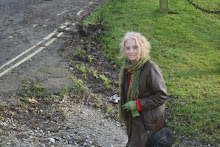"Remembering The Light Of The Horses.."

This painting," Whistlejacket" is by George Stubbs, born in Liverpool in 1724. He appreciated both the anatomical and the lyrical beauty of the horse.
In my writing classes this week, we looked at a wonderful poem called " Horses". It was written by Pablo Neruda, a Chilean poet, and translated from the Spanish by Stephen Mitchell.
Remembering a winter in Berlin, Neruda descibes a particularly stunning image.Other more important happenings connected with that time have been forgotten, but this image was so sudden, so powerful in its beauty, that it was unforgettable..
"Horses"
"From the window I saw the horses.
I was in Berlin, in winter. The light
was without light, the sky without sky.
The air white like wet bread.
And from my window a vacant arena,
bitten by the teeth of winter.
Suddenly, led by a man,
ten horses stepped out into the mist.
Hardly had they surged forth, like a flame,
than to my eyes they filled the whole world,
empty till then. Perfect, ablaze,
they were like ten gods with pure white hoofs,
with manes like a dream of salt.
Their rumps were worlds and oranges.
Their colour was honey, amber, fire.
Their necks were towers
cut from the stone of pride,
and behind their transparent eyes
energy raged, like a prisoner.
And there, in the silence, in the middle
of the day, of the dark, slovenly winter,
the intense horses were blood
and rhythm, the animating treasure of life.
I looked, I looked and was reborn: without knowing it,
there, was the fountain, the dance of gold, the sky,
the fire that revived in beauty.
I have forgotten that dark Berlin winter.
I will not forget the light of the horses."
Later the class wrote about particularly strong images lingering in their own memories. One woman recalled being five years old; her mother came downstairs with a suitcase, threatened to leave marriage and family. The writer hadn't thought about this for decades but through revealing this moment in time, she showed her mother's dilemma brilliantly. An elderly man described his first lecture at university; this was when few young men of his background had this opportunity. We glimpsed his excitement, the delight he felt in the green tiled lecture hall. Another woman showed us the exact moment she fell in love , someone else described the colours of Caribbean skies at dawn. We saw the moment when she recognised this natural perfection.
We had glimpses into many different lives; they provoked our thoughts and as always, we felt richer for the privelege. And all these glimpses, I imagine, could be called, as Neruda said, "the animating treasure of life"...


0 Comments:
Post a Comment
<< Home